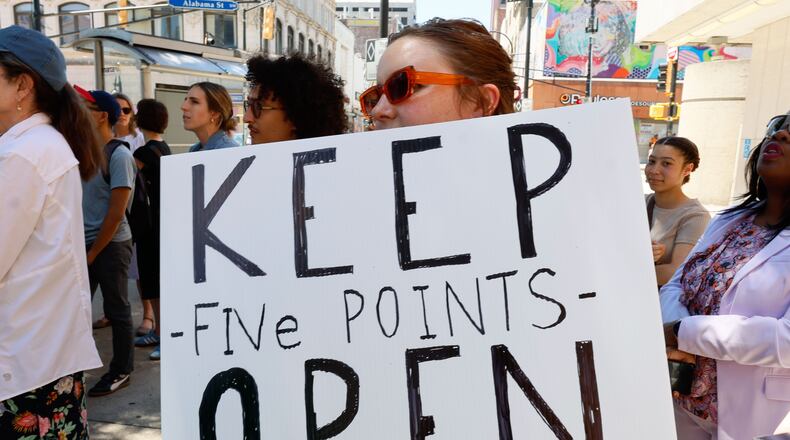Atlanta community leaders continued to press MARTA to postpone the renovation of Five Points station at a rally outside the transit hub Tuesday.
Several dozen community, business and city leaders gathered to protest MARTA’s plans to close street access to Five Points next month as it begins construction of the project. They called for MARTA to maintain pedestrian and bus access to the station throughout the four-year construction period. And they repeated a call to postpone construction until MARTA has developed a better plan.
“We need to think about Atlantans today who are using this system, who rely on this system to get to work, to get to school, to get to the store, to get their kids to day care,” Atlanta City Councilman Jason Dozier said.
MARTA has expressed a willingness to do more to address concerns about the impact on passengers. But on Tuesday it continued to insist the construction must move forward, in a statement released after the rally.
“We are full steam ahead to revitalize Five Points and deliver an enhanced experience for our riders with as limited disruption as possible,” the agency said. “Delaying this work is irresponsible and does nothing to alleviate the service impacts necessary for such complex deconstruction work.”
MARTA plans to remove the existing concrete canopy over the station and replace it with a translucent roof. The idea is to improve air circulation and light and to replace a structure that leaks when it rains. The agency also plans to build new street-level bus bays and add greenspace to make the surrounding plaza more appealing.
Credit: Courtesy of MARTA
Credit: Courtesy of MARTA
The project will be paid for mostly with money from a half-penny transit sales tax approved by Atlanta voters in 2016. A $25 million federal grant and $13.8 million in state funding also will help.
Some city and business leaders have long objected to MARTA’s design. They say the bus bays will hinder pedestrian access and the design does not create the kind of “city square” feel they’d like to see at the downtown transit hub.
Mayor Andre Dickens recently asked MARTA to postpone the work, citing preliminary findings that show MARTA may need to repay tens of millions of dollars to its Atlanta expansion fund. Dickens also wants a pause to consider other transit spending priorities. MARTA disputes the findings.
Critics also have blasted MARTA’s plans to close street access to the station during construction. Though rail passengers would still be able to transfer trains at Five Points, buses would be rerouted to nearby stations beginning July 6, and pedestrians would have to catch trains elsewhere beginning July 29. The station would temporarily reopen for the 2026 World Cup soccer tournament.
Deborah Scott, CEO of the community group Georgia Stand-Up, blasted that plan Tuesday. She said MARTA is ignoring the needs of minority passengers who use the transit system daily.
“When you talk about having a MARTA station open for the World Cup but not having it open for the people?” Scott said, drawing cheers. “That’s a problem.”
Dickens repeated his own call to a halt to the Five Points renovation in a statement released Tuesday.
“I echo the frustrations expressed by Atlantans today over the proposed Five Points redevelopment plan,” the mayor said.
MARTA said decades of leaking water have damaged the canopy, which poses a safety hazard for customers. It said it cannot safely keep the station open during demolition of the existing canopy. Because the project relies on federal funding, MARTA said delaying construction could affect the agency’s ability to secure such funding in the future.
Construction is expected to last until 2028, but it’s unclear how long the closure would last. MARTA’s initial presentations to its own board and the City Council showed the street closure would last until 2028.
MARTA CEO Collie Greenwood recently told Dickens he did not expect the closure to last through 2028, though he was not more specific. In a statement provided to The Atlanta Journal-Constitution before Tuesday’s rally, MARTA said it will re-evaluate street access after 18 months.
About the Author
Keep Reading
The Latest
Featured




